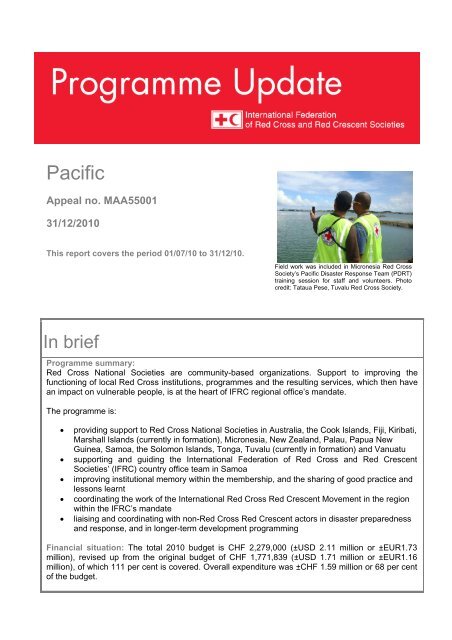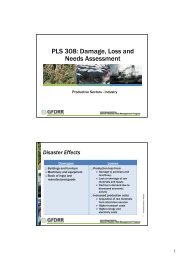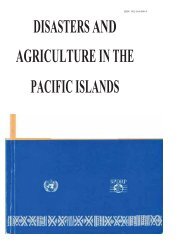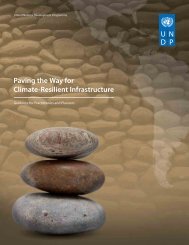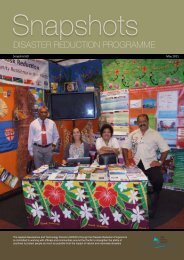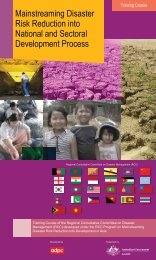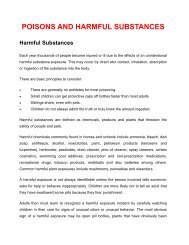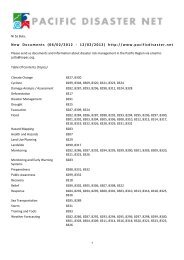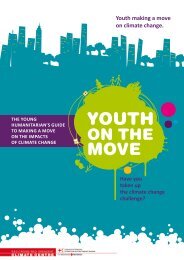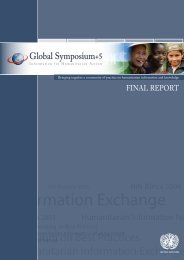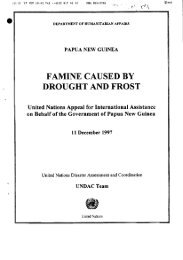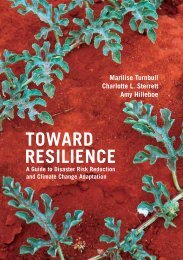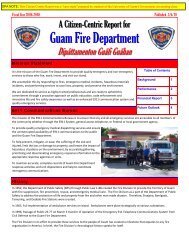Download PDF - ReliefWeb
Download PDF - ReliefWeb
Download PDF - ReliefWeb
- No tags were found...
Create successful ePaper yourself
Turn your PDF publications into a flip-book with our unique Google optimized e-Paper software.
Organizational developmentOutcomes/Expected results1. Organizational issues have been addressed in individual National Societies through tailor-madeorganizational development (OD) and capacity-building initiatives.2. There is increased integration of organizational development and capacity-building aspectswithin health and care and disaster managementprogrammes.3. Sharing of lessons learned, best practices, and skilledNational Society practitioners providing National Societypeer support in OD and capacity building across theMovement components in Asia Pacific.AchievementsTailored organizational development interventions by the IFRCtargeting specific institutional or service delivery problems inPacific National Societies contribute to more effectiveinstitutions, programmes and services.Sharing lessons learned.Photo credit: IFRC• Governance strengtheningThe Knowing Governance, Knowing Leadership project was initiated with the aim of developingculturally cognizant processes for building good governance practice across National Societies inthe Pacific region. The findings from the April-July 2010 consultation of Pacific National Societiesleaders (management and board) on governance strengths and challenges were synthesized into apaper that was shared with all National Societies. In August, a project design workshop wasorganized inviting past and present leaders from the Pacific National Societies, IFRC and ICRC toexplore sustainable ways of supporting enhanced governance. The findings from the consultationmentioned above, informed the workshop discussions. The participants brainstormed and evaluatedthe options available to National Societies for strengthening governance. The National Societyrepresentatives developed a final project concept and have established a working group to run theinitial year-long project, which is likely to be extended. IFRC will provide significant support, bothtechnical and financial, to this initiative.• Kiribati Red Cross SocietyThe Kiribati Red Cross Society hosted an OD learning event, supported by the IFRC, with 16participants comprising board members, volunteers and staff. The event was designed to explorethe country’s vulnerabilities and the National Society’s role in addressing these as an auxiliary to thegovernment. Discussions also focused on the society’s strategy and legal base revision. The IFRCteam – the zone OD coordinator and the Pacific regional programme coordinator – met with thegoverning board and staff. They agreed a short-term plan of action focused on a membershipdevelopment, completion of the annual report and audit, preparation for the 2011 plan and budget,ongoing work on statutes, strategic planning and the next general assembly. These milestones areprecursors to the start of the three-year Enhancing Community Capacity Programme, which isfunded by the IFRC through the Intensified Capacity-building Fund.10
• Ongoing support to Kiribati Red Cross SocietyThe IFRC provides ongoing support to the Kiribati Red Cross Society in meeting statutoryrequirements and on organizational development initiatives. The Kiribati Red Cross has completedits strategic planning process and drafted its strategic plan for 2011–2013. It has also initiated amajor membership drive.• Organizational development in FijiA meeting was organized for the Fiji Red Cross –facilitated by the IFRC – that encouraged participantsto reflect on the National Society’s strengths, itsimage in Fiji and the relevance of existing Red Crossprogrammes for the country’s most vulnerable people.• Peer exchange programmesPeer exchange was initiated between the AustralianRed Cross and the Kiribati Red Cross Society, with afocus on developing the planning and managementskills of the Kiribati’s secretary general. The firstReflecting on the National Society’s strengths.Photo credit: IFRCmission from the Australian Red Cross took place in July. Overall, the peer exchange programmehas developed the planning and management capacities of the National Society and its staff. Morepeer support missions are planned for the Kiribati Red Cross Society in 2011 by the Cook IslandsRed Cross Society and the Australian Red Cross.• Asia Pacific youth summitThe IFRC’s Pacific regional office financially supported representatives from the Fiji Red Cross andCook Islands Red Cross to attend and participate in the Asia Pacific and Middle East youth forumand statutory conference held in Amman in October.• Pacific leadership meetingDuring the Asia Pacific conference, a leadership meeting was facilitated by the IFRC. Key decisionswere made about the governance enhancement project (mentioned above), the development of aregional humanitarian diplomacy strategy, the signing of pre-deployment agreements between theIFRC and National Societies with regional disaster response team members, as well as the agendafor the Pacific regional partnership meeting in May 2011.• Solomon Islands Red Cross annual general meeting (AGM)The National Society has faced some major financial management challenges and, as a result, anumber of partners had frozen funding until audits had been completed. The National Societytherefore requested support from ICRC and the IFRC to hold their AGM. The IFRC has defined aregional finance development programme to target finance development in the Solomon Islands,and three other National Societies, starting in 2011.• Planning support to the Samoa Red Cross SocietySupport was provided to the Samoa Red Cross Society to develop and prepare a draft tsunamiproposal for Samoa in time for the May 2010 partners’ meeting. The process used was ‘intensiveiterative conversation and review’ based on a collaborative team approach. The team consisted of aplanning adviser, the National Society’s secretary general and the IFRC’s head of office. Intensiveiterative conversations were also held with the National Society’s health and disaster managementteams and finance unit, and with the IFRC’s delegates for livelihoods, logistics and finance. Thecollaborating team reviewed the written materials from the previous day and considered emergingquestions, reviewed related HR information and possibilities, and developed a budget that reflectedemerging priorities.11
• Support to the resolution of the governance dispute in SamoaThe Pacific regional office is coordinating Movement support to the Samoa Red Cross Society toresolve a governance dispute. ICRC and the IFRC are liaising closely to define the most appropriatesupport for the National Society. An experienced IFRC representative undertook several visits toSamoa to mediate and facilitate discussions with key Red Cross members, staff and externalstakeholders. Briefing documents were produced to ensure Movement partners, the zone andGeneva offices were kept informed and consulted.• Advisory support to the Palau Red Cross SocietyThe Pacific regional office has provided ongoing governance support to the National Society duringthe reporting period. Following an urgent request from the National Society, a finance developmentmission was due to take place in December.• Support to the Pacific organizational development working groupThe IFRC supported the working group with technical materials and by undertaking specific tasksarising from the meetings of the working group including, for example, the analysis of completedwell-functioning National Society self-assessment questionnaires, updating National Society basicprofiles and data sheets, and disbursing financial resources allocated through and by the workinggroup.• Solomon Islands and Papua New Guinea Red Cross participation in resource mobilizationtraining and networking eventParticipants benefited from sessions on innovation in fund-raising, direct mailing, media campaigns,accurate project budgeting to ensure overheads are covered, corporate fund-raising, role ofvolunteers in fund-raising and fund-raising at branch level.• Supporting Tuvalu Red Cross Society towards recognitionThe IFRC Pacific regional office – in close coordination with ICRC and other partners – providedregular support to the Tuvalu Red Cross Society in its preparation for recognition. In July, the TuvaluRed Cross Society elected a new governing board at its general assembly, where revised statuteswere also adopted. Progress and financial reports for the years 2007, 2008 and 2009 – together withthe plan and budget for 2011 to 2012 – were presented and approved. Prior to the meeting,representatives took part in a workshop to review the Society’s strategic plan 2010–2014, which wasapproved during its general assembly. To take advantage of branch attendance, first-aid training,volunteer development and communications training took place following the general assembly.• Intensified capacity-building in the Cook IslandsThe Cook Islands Red Cross Society has participated in a global study on the impact of intensifiedcapacity-building and organizational development. The Secretary General and a staff member fromthe National Society participated in the peer researcher training event in Budapest. The CookIslands Red Cross Society has partnered with Palang Merah Indonesia (PMI) (in English, theIndonesian Red Cross) to carry out forthcoming peer assessment activities.• Finance development support to Papua New Guinea Red Cross SocietyThe IFRC supported the National Society to clear outstanding acquittals through the mobilization ofa finance delegate. A number of recommendations on finance development were also made and theNational Society was also assisted to implement improved procedures for transferring andmonitoring working advances to branches. In addition, specific recommendations were made aboutthe profile and skills that finance staff need to have and, as a result, this advice has informed theNational Society’s recent finance staff recruitment.• Human resource management in the Solomon Islands12
The IFRC assisted the Solomon Islands Red Cross Society in reviewing its human resourcesystems, including human resource policies and procedures. The support was focused on thepractical implementation of existing policies and procedures.• Spanish Red CrossFunds from the Spanish Red Cross were channelled to eight Pacific National Societies through thePacific organizational development working group. The group contributed to a number ofachievements during the reporting period.o For the first time, the Cook Islands Red Cross Society was able to recruit a finance andadministration officer to ensure the smooth running of its finance and administrationfunctions.o The Solomon Islands Red Cross Society was able to complete a review of its finance policyand established a chart of accounts for all donor funds. In addition, the National Societysuccessfully completed internal and external audits, financial management training anddeveloped a governance strengthening training package.o The Vanuatu Red Cross Society completed an internal audit, printed the Red Cross manualfor its junior and youth volunteer programme, and procured first-aid kits, as well as acomputer and projector.o The Palau Red Cross Society procured a computer in order to maintain a record of membersand blood donors.Constraints or challenges• Helping members develop their understanding of a National Society’s core business and realizethe importance of fulfilling statutory requirements is often a challenge. National Societies find itdifficult to achieve a balance between the implementation of short-term projects, funded byinternational partners and donors, and the development of locally-initiated, locally managed andresourced programmes. The regional office is advocating the need for National Societies to find abetter balance between domestically initiated and internationally initiated activities. It is hopedthat the renewed focus on commercial first aid in the region will contribute to increased financialautonomy and more locally owned programming. The country level Movement planningdiscussions also provide a forum for defining more sustainable partnership and programmingapproaches by regional Movement Partners.• Providing in-country, focused OD support to National Societies is another challenge for theIFRC’s regional office, which often has limited human and financial resources itself. To overcomethis challenge, the regional delegation is promoting more peer-to-peer support among the PacificNational Societies and the integration of OD activities within health and disaster managementprogrammes. Resources are also being sought from the wider Asia Pacific region whereappropriate.International Disaster Response Laws, Rules and Principles (IDRL)Outcomes/Expected results1. Technical assistance to governments• Policy-makers understand and make use of the IDRL guidelines to strengthen legal andpolicy frameworks for disaster response.2. Training and capacity-building• Interested National Societies and humanitarian partners are empowered to advocate forstrengthened legal frameworks for disaster response.3. Dissemination, advocacy and research• IDRL guidelines are well known, partnerships are developed and the knowledge baseof the Movement on legal issues in disaster response is deepened.13
AchievementsIDRL activities in the Pacific are carried out according to the global IDRL plan and budget (availablehere). The 2009 annual report is also available online.Technical assistance to governments• The IDRL programme has provided technical input to SOPAC’s ongoing support to governmentdisaster risk management review processes in the Pacific.• In Vanuatu, a four-month-long technical assistance review project started in late August. Theproject is being carried out in partnership with the government’s National Disaster ManagementOffice (NDMO) and the Vanuatu Red Cross Society.• The IDRL programme continues to seek opportunities to engage National Societies and nationaldisaster management authorities on research work towards improved legal preparedness forinternational disaster response.Training and capacity-building• In the Cook Islands – following an UNOCHA-facilitated national-level contingency planningworkshop in June – the regional office together with Cook Islands Red Cross Society, held aforum on domestic facilitation and regulation of international disaster response in November.The forum was held in collaboration with Emergency Management Cook Islands (EMCI), thenational disaster authority. Participants included representatives from government ministries,civil society and international development agencies. The forum concluded with a number ofrecommendations, including the request for the IDRL programme to support a review of nationallegislation related to foreign disaster response.Dissemination, advocacy and research• The Pacific regional office continues to seek further cooperation with regional organizations.Regional office collaboration with UNOCHA has increased with a contribution made to thenational-level contingency planning workshop in Tonga in September, and participation in thethird annual regional workshop for humanitarian assistance in the Pacific in December.• The regional office has worked with SOPAC towards its endorsement of IDRL activities to itsmembers, and a memorandum of understanding with SOPAC is still under discussion.• Future collaboration with the Pacific Islands Forum Secretariat (PIFS) is being explored.Constraints or challenges• The introduction of a new concept continues to be a challenge in a region where small NationalSocieties and government agencies are already stretched by multiple priorities. A particularchallenge has been overcoming the obstacles related to implementing country-level technicalreview projects.• In an effort to address this challenge, the regional office has developed an approach thatrequires the legal researcher and IDRL delegate to play a greater role, whilst governmentcounterparts and National Societies are less involved in the detailed research process. Thisapproach also focuses more on enhanced collaboration with regional and internationalorganizations, in particular by raising awareness and providing technical input into theirprogramming activities.14
Working in partnership• The Pacific regional office continued working with Movement and external partners tostrengthen the work of the Red Cross in the region.• Within the Movement, the Pacific regional office continued to facilitate country-basedpartnership discussions with the aim of promoting more sustainable programming approaches.Movement visits and partnership meetings were held in Tonga and the Solomon Islands inSeptember and November respectively. A follow-up teleconference to share progress onactions agreed at the partnership meeting in Vanuatu in April was also arranged.• Close collaboration between the IFRC’s regional office and the ICRC’s regional delegationcontinued over the reporting period. The collaboration focused on the governance strengtheningprogramme, the preparation and financing of Movement visits to member National Societies,jointly defining the future resolution of integrity issues in National Societies, coordinatedresponses to Pacific humanitarian team initiatives and the initiation of a Movement pamphlet forprofiling the work of the Red Cross in the Pacific.• The aim of the Pacific Monthly e-mail newsletter is to promote sharing of good practice,celebrate successes in the region, and to share information about programmes, projects andevents. National Societies and ICRC contribute to each newsletter.• A second regional coordination meeting was held in 2010. The aim of these meetings is toensure that regional partners – including the IFRC, ICRC, and the Australian, New Zealand andFrench Red Cross – are exchanging information about their strategies and working towardscommon capacity-building approaches in the Pacific. Here are some of the outcomes from thecoordination meeting held in December.ooooooooDraft regional guidelines on the organization and National Society attendanceat capacity-building events were reviewed. These guidelines aim to ensurethat opportunities to attend training events support National Society prioritiesand are offered in an equitable manner.A review was carried out of regional and zone capacity-building events in2011.The Pacific regional finance development programme received backing fromall regional partners.A common position on requests for travel support to the 2011 statutorymeetings in Geneva was agreed upon.A best-value-for-money venue was identified for the 2011 regional partnershipmeeting.An IFRC internal brief was developed on the humanitarian reform process forPacific members attending the Pacific humanitarian team annual meeting.It was agreed that a desk study would be carried out on lessons learnt fromthe Samoa and Tonga tsunami appeal processes.A decision was made to establish a Pacific country team roster for emergencyresponse operations which require international assistance.• The IFRC is promoting the disaster management framework among Red Cross partners tomaximize capacity-building in the region. This framework has been developed by the disastermanagement advisory group, which is strongly supported by the IFRC.• The IFRC disaster management team participates actively in regional forums, including thepacific humanitarian team, the regional disaster risk reduction platform and the UNOCHAfacilitatedPacific cluster approach. The IFRC has used these forums to advocate disaster riskreduction, climate change adaptation, IDRL, SPHERE standards and the Code of Conduct fordisaster response. In June 2010, the IFRC convened the first National Society disastermanagement advisory group meeting in Fiji. The advisory group promotes partnershipsbetween National Societies to promote regional cooperation, knowledge-sharing and capacity-15
uilding. IFRC works with National Society partners in the region (Australian, American, Frenchand New Zealand Red Cross Societies) to ensure a coherent and coordinated approach todisaster management.• The Pacific regional office contributed to regular meetings of the Pacific humanitarian team tosupport the implementation of the IASC cluster system for disaster response. The Pacifichumanitarian team – with members of UN agencies and other humanitarian agencies in theregion – is also working towards cluster preparedness. In this context, the Pacific regional officetook part in discussions on the emergency shelter cluster. In line with the IFRC’s shelter clusterconvener role at global level, the Pacific regional office undertook the role of shelter clusterconvener at regional level, with the support of the shelter coordinator in Kuala Lumpur. In 2011,additional resources, including the arrival of the shelter delegate, will speed up the process.• The Pacific regional office continued to participate in the Pacific Disaster Risk ManagementPartnership Network, led by SOPAC. In this capacity, the disaster management coordinator,IDRL delegate and community resilience officer all participated in the fifth annual meeting of thenetwork, as well as contributing to early preparations for the sixth annual meeting, which isscheduled to be held in 2011.• The Pacific regional office is a member of the working group on disaster risk managementmainstreaming as part of the Pacific disaster risk management partnership network, and isrepresented at the working group by the IDRL delegate. The community resilience officer anddisaster management coordinator have been leading the community-based working group toshare experiences, lessons learnt and expertise among regional community-basedstakeholders.• The regional office worked with the water, sanitation and hygiene (WASH) coalition, a regionalplatform for information-sharing.• The office continued to work in partnership with PIAF at a regional level. The regional teamsupported PIAF’s work on workplace HIV policies and shared the IFRC’s workplace policyguidelines and the Fiji Red Cross workplace policy. The health team developed and launched ajoint briefing paper on HIV-related stigma and discrimination in the Pacific countries inpartnership with PIAF and the Australian Red Cross. The regional team coordinates PIAF’s incountryactivities with National Societies.• IFRC is a member of the steering committee for ‘Piloting climate change adaptation to protecthuman health in Fiji’, which is chaired by the ministry of health. The committee oversees andsupports the implementation of the project, which is funded by the Global Environment Facility(GEF) through WHO and UNDP. The health team supported the Fiji Red Cross Society todevelop and submit a community-based activity plan for the project.Contributing to longer-term impactRed Cross National Societies are community-based organizations. Support to improving the long termfunctioning of local Red Cross institutions, programmes and the resulting services, which then have animpact on vulnerable people, is at the heart of the IFRC regional office mandate.Communities do not differentiate between health and disaster management needs – they just haveneeds. In recognition of this, the regional office is promoting the development of more integrated andholistic approaches to community-based programming by National Societies through its organizationaldevelopment, health and disaster management support.Tailored OD interventions by the IFRC targeting specific institutional or service delivery problems inPacific National Societies contribute to more effective institutions and programmes and services.Service improvements contribute to improvements in people’s lives.16
Our focus on developing more synergistic cooperation within the Movement through country levelharmonized Movement planning aims to ensure that resources are maximized for the benefit ofvulnerable people. The regional office also strongly promotes the exchange of knowledge and skillsbetween National Societies in order to maximize the capacities available within the region.Participation in regional coordination mechanisms is contributing to clarifying and promoting themandate and fundamental principles of the Red Cross in the region. Furthermore, we are contributingto more coordinated disaster management activities between humanitarian actors in the region therebyreducing the duplication of effort.The IDRL programme promotes the implementation of the IDRL guidelines, raises awareness of legalissues in disaster management and supports nation states and regional organizations in their work onincreasing international cooperation on legal preparedness for disaster risk reduction and response.Looking aheadRegional office strategic goal 1: Supporting National Societies to be autonomous, relevant andinfluentialIn defining its work with National Societies, the team at the Pacific regional office is primarily guided bythe needs of vulnerable people, the value of voluntary service and the critical role of branches inreaching out to communities. The regional office is also mindful that, through good governance andmanagement, members, volunteers and staff are able to participate meaningfully in decision-makingprocesses. We believe that good leadership, with clarity about the roles of governance andmanagement, is critical to the sustainable growth of Pacific National Societies.Tailored organizational development support will continue to be a priority in 2011. Our work in 2010reaffirmed the importance of strong support to the development of enhanced governance across theregion and in finance development. Alongside already planned tailored governance work for specificNational Societies – namely, Micronesia, Palau, Tonga, Vanuatu, Samoa, Kiribati and Tuvalu – theIFRC will support the activities of the newly created Pacific governance working group. For the first sixmonths of 2011, this membership-led group has prioritized the development of a governanceassessment tool, the revision of the Pacific governance training package, the identification of volunteergovernance trainers and a pilot training event in the Cook Islands. The outcomes from this pilot will bepresented to all National Society leaders at the 2011 regional partnership meeting, which will be held inFiji in May.A finance development delegate will start in this new regional post in early 2011. The delegate willsupport finance development in four National Societies – the Solomon Islands, Papua New Guinea,Kiribati and Vanuatu. Finance delegates based in Samoa (funded by the IFRC) and Tonga (funded bythe Australian Red Cross) will continue to support those National Societies during the first half of 2011.The Palau Red Cross Society will receive continued support from the regional office in the form ofshort-term assistance or other appropriate inputs in finance development.Ongoing commitment from partners to support IFRC-led disaster management activities in 2011 haslargely been secured. This will allow for the continuation of existing disaster management activities.The scaled up work in emergency shelter cluster coordination will require additional human resources.A shelter delegate position will be advertised in December/January.The disaster management team implement training based on the needs analysis conducted in 2010. AtNational Society branch level, specific attention will be given to capacity-building in emergencyresponse and emergency logistics management. At headquarters level, attention will be focused oncoordination and management for emergency response. In parallel, the disaster management team willcontinue to support National Societies’ preparation through the prepositioning of emergency stocks,17
disaster management planning and contingency planning. Finally, a community-level pilot programmewill continue to be supported in the Cook Islands and a number of initiatives related to climate changeadaptation will also be carried out.The health team will support the development of the IFRC health strategy in the region. The healthteam is in the process of mapping existing National Society health programmes in order to inform thisstrategic planning process. The IFRC health programme relies heavily on financial support earmarkedfor HIV from the Global Fund. Efforts will be made to diversify funding streams. The new 2010–2011contribution from the New Zealand Red Cross for CBHFA – combined with ongoing support from theJapanese Red Cross Society – will allow the IFRC to address wider health issues in the region. Widerhealth issues include encouraging communities to take advantage of available health services andseek early advice, reversing the trend towards a sedentary lifestyle, tackling the effects of climatechange on health, and reducing the impact of disasters on health outcomes.The second phase of the Global Fund-supported HIV programme started in the last quarter of 2010 fora period of three years. It will support health initiatives in Samoa, Kiribati, Micronesia and the CookIslands. The New Zealand Red Cross will continue its financial and technical support for CBHFA andcommercial first aid in 2011. A proposal will be developed to seek ongoing support from the NewZealand Red Cross for 2012.Regional office strategic goal 2: Speaking out on behalf of vulnerable peopleThe membership has approved work on the development of a regional humanitarian diplomacystrategy. A staff-on-loan position has been opened to support this regional process. The draft strategywill be developed in consultation with members and presented at the regional partnership meeting inMay 2011. In 2010, members unanimously supported the idea of exploring cooperation with the PacificIslands Forum Secretariat. This explorative work has already started and will continue in 2011.The 31st International Conference of the Red Cross and Red Crescent, scheduled for November 2011,is an important milestone for the Movement. States and National Societies will be invited to report ontheir progress in implementing the resolutions from the 30th International Conference, which took placein 2007. The IFRC and ICRC will support Pacific National Societies to engage with their governmentsregarding reporting on pledges made at the last conference. The New Zealand Red Cross will behosting a preparatory policy dialogue meeting ahead of the conference for all Pacific National Societies.The IDRL programme will endeavour to support both states and National Societies to ensure that theyhave positive progress to report on IDRL issues at the 2011 International Conference.Regional office strategic goal 3: Facilitating regional cooperation and coordinationIn 2011, the regional office will continue to facilitate regional cooperation initiatives such as policy andstrategy dialogue, operational cooperation, peer exchanges and joint learning. Regional coordinationbetween Pacific National Societies, the IFRC, ICRC and participating National Societies will continue tobe facilitated through country-level and regional meetings.When they arise, the resolution of National Society integrity issues will be closely coordinated with theregional ICRC office in Suva.The Pacific Monthly newsletter will continue to be published with contributions from National Societies.The newsletter will be adapted slightly in 2011 in order to be shared with non-Movement actors.A regional partnership meeting is scheduled for May 2011. The objectives, as defined by Pacificmembers, will be to explore common challenges and ways to address these, to share information andbest practice, to develop a common understanding of priority humanitarian issues in the Pacific, and todevelop policy dialogue and a common position. Agenda items will include progress against Strategy2020, the Pacific governance enhancement project, succession planning, the review of the draft Pacifichumanitarian diplomacy, the auxiliary role of National Societies, the 31st International Conference ofthe Red Cross and Red Crescent and how Pacific states need to prepare.18
Regional office strategic goal 4: Developing a strong IFRC team with continuityIn 2011, the Pacific regional team will continue to develop more holistic approaches to its work. This willinvolve planning and managing programmes based on a National Society’s overall priorities,developing programme staff’s understanding of organizational development, meeting on a regular basisas a whole programme team to discuss progress and share lessons learnt about the work at countrylevel, and ongoing tailoring of the team’s structure to better support integrated work.Specific initiatives will focus on ensuring diversity within the regional office and increasing PacificIslander representation. Discussions are already underway with participating National Societiesregarding how to develop more systematic and sustainable mechanisms to improve Pacific Islanderrepresentation.Following strong messages from members about the need for more consistent and coherent supportfrom the IFRC, the regional office has:1. developed a four-year strategy in consultation with members2. continued to strive for delegate continuity3. engaged additional local staff to promote continuity4. drawn on the expertise of people outside the regional team with strong experience in the Movementand the Pacific to provide tailored support to membersThese initiatives will be ongoing in 2011.Some restructuring within the administration and finance teams in 2011 will increase the regionalteam’s administrative, logistics, financial and human resources capacities.19
How we workThe IFRC’s activities are aligned withits Global Agenda, which sets outfour broad goals to meet the IFRC’smission to "improve the lives ofvulnerable people by mobilizing thepower of humanity".Contact informationGlobal Agenda goals:• Reduce the number of deaths, injuries and impact fromdisasters.• Reduce the number of deaths, illnesses and impact fromdiseases and public health emergencies.• Increase local community, civil society and Red Cross RedCrescent capacity to address the most urgent situations ofvulnerability.• Reduce intolerance, discrimination and social exclusion andpromote respect for diversity and human dignity.For further information related to this report, please contact:IFRC in SuvaPacific regional office, Tel.: +679 33 11 855, Fax: +679 33 11 406• Aurelia Balpe, Head of regional office for the Pacific, E-mail: aurelia.balpe@ifrc.org• Mukesh Singh, Regional programme coordinator for the Pacific, E-mail: mukesh.singh@ifrc.orgIFRC in Asia PacificAsia Pacific zone office, Kuala Lumpur:• Al Panico, Acting head of operations, Asia Pacific zone, E-mail: al.panico@ifrc.org, Tel.: +603 9207570o, Fax: +603 2161 0670Resource mobilization and planning, monitoring, evaluation and reporting (PMER) unit• Alan Bradbury, Head of resource mobilization and PMER, E-mail: alan.bradbury@ifrc.org,Tel.: +603 9207 5771, Fax: +603 2161 067020
International Federation of Red Cross and Red Crescent SocietiesMAA55001 - Pacific regionInterim Financial ReportI. Consolidated Response to AppealSelected ParametersReporting Timeframe 2010/1-2010/11Budget Timeframe 2010/1-2010/12AppealMAA55001BudgetAPPEALAll figures are in Swiss Francs (CHF)DisasterManagementHealth andSocial ServicesNational SocietyDevelopmentPrinciples andValuesCoordinationTOTALA. Budget 750,000 831,035 472,434 0 225,531 2,279,000B. Opening Balance 409,457 104,242 189,218 0 236,554 939,471IncomeCash contributions# Australian Red Cross 228,263 31,585 0 259,848Australian Red Cross (from Australian Government) 100,680 100,680Canadian Red Cross (from Canadian Government) 0 0DFID - British Government -462 -462Finnish Red Cross 330 330Finnish Red Cross (from Finnish Government) 1,873 1,873Germany Red Cross 27,196 27,196Japanese Red Cross 144,561 114,444 72,280 24,093 355,379Netherlands Red Cross (from NetherlandsGovernment) 40,541 40,541New Zealand Government 49,972 76,300 126,272New Zealand Red Cross 130,000 -16,188 113,812Other -4,030 -4,030The Global Fund (to fight AIDS, TB & Malaria) (fromSecretariat of the Pacific Community (SPC)) 101,147 101,147# C1. Cash contributions 537,211 345,130 137,649 102,596 1,122,586Outstanding pledges (Revalued)# Japanese Red Cross 49,665 49,665Netherlands Red Cross (from NetherlandsGovernment) -29,757 -29,757The Global Fund (to fight AIDS, TB & Malaria) (fromSecretariat of the Pacific Community (SPC)) -106,515 -106,515# C2. Outstanding pledges (Revalued) 19,908 -106,515 -86,607Income reserved for future periods# DFID - British Government 6,573 6,573The Global Fund (to fight AIDS, TB & Malaria) (fromSecretariat of the Pacific Community (SPC)) 334,637 334,637# C3. Income reserved for future periods 341,211 341,211Inkind PersonnelAustralian Red Cross 78,907 78,907Finnish Red Cross 8,213 8,213Japanese Red Cross 83,893 83,893New Zealand Red Cross 38,720 38,720C5. Inkind Personnel 162,800 38,720 8,213 209,733C. Total Income = SUM(C1..C6) 719,918 618,546 137,649 0 110,809 1,586,923D. Total Funding = B +C 1,129,375 722,788 326,867 0 347,363 2,526,394Appeal Coverage 151% 87% 69% #DIV/0 154% 111%Extracted from the IFRC audited financial statements Prepared on 22/Dec/2010 Page 1 of 3
International Federation of Red Cross and Red Crescent SocietiesMAA55001 - Pacific regionInterim Financial ReportSelected ParametersReporting Timeframe 2010/1-2010/11Budget Timeframe 2010/1-2010/12AppealMAA55001BudgetAPPEALAll figures are in Swiss Francs (CHF)II. Balance of FundsDisasterManagementHealth andSocial ServicesNational SocietyDevelopmentPrinciples andValuesCoordinationTOTALB. Opening Balance 409,457 104,242 189,218 0 236,554 939,471C. Income 719,918 618,546 137,649 0 110,809 1,586,923E. Expenditure -711,012 -523,119 -140,060 -168,236 -1,542,427F. Closing Balance = (B + C + E) 418,363 199,670 186,807 0 179,127 983,967Extracted from the IFRC audited financial statements Prepared on 22/Dec/2010 Page 2 of 3
International Federation of Red Cross and Red Crescent SocietiesMAA55001 - Pacific regionInterim Financial ReportSelected ParametersReporting Timeframe 2010/1-2010/11Budget Timeframe 2010/1-2010/12AppealMAA55001BudgetAPPEALAll figures are in Swiss Francs (CHF)III. Budget Analysis / Breakdown of ExpenditureAccount GroupsBudgetDisasterManagementHealth and SocialServicesNational SocietyDevelopmentExpenditurePrinciples andValuesCoordinationTOTALVarianceA B A - BBUDGET (C) 750,000 831,035 472,434 0 225,531 2,279,000SuppliesShelter - Relief 20,000 12,239 12,239 7,761Construction Materials 15,000 15,000Medical & First Aid 36 1,710 1,746 -1,746Utensils & Tools 15,000 14,985 14,985 15Other Supplies & Services 25,000 8,450 151 8,601 16,399Total Supplies 75,000 35,710 1,861 37,570 37,430Land, vehicles & equipmentComputers & Telecom 26,600 2,716 2,976 10,544 16,236 10,364Office/Household Furniture & Equipm. 148 148 -148Total Land, vehicles & equipment 26,600 2,716 3,124 10,544 16,384 10,216Transport & StorageDistribution & Monitoring 1,667 1,667 -1,667Transport & Vehicle Costs 639 1,535 821 363 3,357 -3,357Total Transport & Storage 639 3,201 821 363 5,024 -5,024PersonnelInternational Staff 530,900 244,141 165,797 12,675 39,623 462,235 68,665Regionally Deployed Staff 42,000 91 91 41,909National Staff 21,607 7,942 5,517 35,067 -35,067National Society Staff 153,400 79 8,994 1,151 10,224 143,176Consultants 29,810 45,988 -1,846 4,172 48,314 -18,504Total Personnel 756,110 311,906 180,887 13,825 49,312 555,931 200,179Workshops & TrainingWorkshops & Training 947,522 175,604 215,822 114,327 23,583 529,336 418,186Total Workshops & Training 947,522 175,604 215,822 114,327 23,583 529,336 418,186General ExpenditureTravel 236,530 130,604 75,712 22,247 64,445 293,008 -56,478Information & Public Relation 43,680 253 235 504 993 42,687Office Costs 21,200 4,947 4,988 2,764 11,677 24,376 -3,176Communications 11,750 9,039 10,198 16,211 13,116 48,564 -36,814Professional Fees 1,951 29 6,154 16,498 24,633 -24,633Financial Charges 12,114 5,096 20 4,028 21,258 -21,258Other General Expenses 21,515 520 520 20,995Total General Expenditure 334,674 158,909 96,259 47,396 110,789 413,353 -78,678Programme & Service SupportProgramme & Service Support 139,094 31,544 28,188 8,158 8,814 76,704 62,390Total Programme & Service Support 139,094 31,544 28,188 8,158 8,814 76,704 62,390ServicesServices & Recoveries 96 96 -96Services & Recoveries 6,538 5,180 490 1,981 14,190 -14,190Total Services 6,538 5,277 490 1,981 14,286 -14,286Operational ProvisionsOperational Provisions -12,553 -11,500 -55,502 -26,606 -106,162 106,162Total Operational Provisions -12,553 -11,500 -55,502 -26,606 -106,162 106,162TOTAL EXPENDITURE (D) 2,279,000 711,012 523,119 140,060 168,236 1,542,427 736,573VARIANCE (C - D) 38,988 307,916 332,374 57,295 736,573Extracted from the IFRC audited financial statements Prepared on 22/Dec/2010 Page 3 of 3


